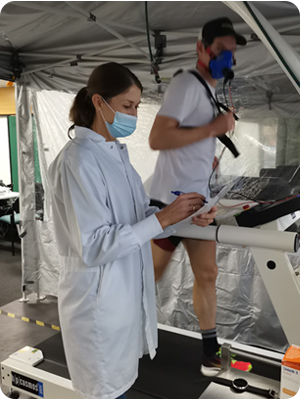Trialling a high-carbohydrate, low-FODMAP diet to reduce gut symptoms during endurance exercise - Rachel Scrivin

Many endurance athletes experience gut issues while exercising, such as the urge to defecate, defecation, nausea and/or vomiting, referred to as exercise-associated gastrointestinal symptoms (Ex-GIS). Many of these symptoms are similar to those who experience irritable bowel syndrome (IBS). A low fermentable oligo-, di-, mono-saccharide and polyol (FODMAP) diet has been shown to improve symptoms in those with IBS. FODMAPs are short-chain carbohydrates that are highly fermentable and osmotic, increasing intestinal gas and fluid, leading to gut symptoms such as bloating, abdominal pain and altered defecation. Due to similarities in symptoms between those who experience IBS and athletes with Ex-GIS, it is not surprising many athletes have trialled a low-FODMAP diet to reduce Ex-GIS.
Rachel has just submitted her PhD thesis to the University of the Sunshine Coast (USC), which included experimental trials at Melbourne’s Monash University and observational trials at Toi Ohomai sports laboratory. The case series conducted at Toi Ohomai involved recreational to elite-level athletes with severe Ex-GIS and ‘control’ volunteers (without Ex-GIS). The GastroAxEx measurement involved a three-hour steady-state run on a treadmill where various physiological strain and gastrointestinal symptom data were recorded. This has been an extremely precise laboratory controlled study, building on a number of similar studies in the exercise gastroenterology space – many by fellow PhD students and one of her four supervisors who specialises in this area and with whom she has co-authored academic articles throughout her study.
Rachel has also participated in national and international conferences, and enjoys disseminating her findings and discussing the implications with athletes, practitioners and fellow researchers.
Rachel’s most recent journal articles include:
Scrivin, R., Slater, G., & Costa, R. J. (2025). Case Series: Management of Exercise-Associated Gastrointestinal Symptoms in Endurance Athletes Using a High-Carbohydrate Low-FODMAP Therapeutic Intervention. International Journal of Sport Nutrition and Exercise Metabolism, 1(aop), 1-18.
Costa, R.J.S., Gaskell, S., Jeacocke, N., Henningsen, K., Martinez, I., Mika, A., Scheer, V., Scrivin, R., Snipe, R., Wallett, A., & Young, P. (2025). Sports Dietitians Australia and Ultra Sports Science Foundation Joint Position Statement: A Practitioner Guide to the Prevention and Management of Exercise-Associated Gastrointestinal Perturbations and Symptoms. Sports Med.
Scrivin, R., Slater, G., Mika, A., Rauch, C., Young, P., Martinez, I., & Costa, R.J.S. (2024). The impact of 48 h high carbohydrate diets with high and low FODMAP content on gastrointestinal status and symptoms in response to endurance exercise, and subsequent endurance performance. Applied Physiology, Nutrition, and Metabolism, 49 (6), 773-791.
Cox, A.M., Scrivin, R., Pelly, F., Langan-Evans, C., Jenkins, D., Reale, R., & Slater, G. (2024). The adaption and validation of a body mass management questionnaire for olympic weightlifters. SM Journal of Nutrition and Metabolism, 8 (7), 1-7.
Author(s)
Rachel Scrivin
